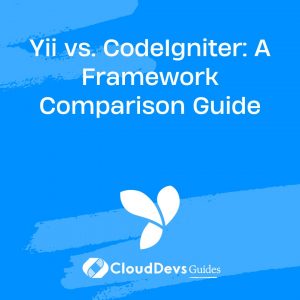Yii vs. CodeIgniter: A Framework Comparison Guide
When it comes to developing web applications, PHP frameworks are essential tools that simplify the process and enhance productivity. Yii and CodeIgniter are two popular PHP frameworks that have gained significant popularity among developers. In this blog post, we will compare Yii and CodeIgniter, highlighting their strengths and weaknesses, to help you make an informed decision for your next project.

Yii Framework: Powerful and Efficient
Yii (Yes, it is!) is a high-performance PHP framework known for its efficiency and extensibility. It follows the “Don’t Repeat Yourself” (DRY) principle, offering a clean and organized code structure. Yii incorporates various advanced features and components, making it suitable for complex applications.
- Performance: Yii is known for its exceptional performance, thanks to its built-in caching support, lazy loading, and optimized database queries. It enables developers to build high-traffic applications without sacrificing speed.
- Security: Yii takes security seriously, providing robust mechanisms for preventing common vulnerabilities such as cross-site scripting (XSS), cross-site request forgery (CSRF), and SQL injection. Its security features make it a reliable choice for developing secure web applications.
- Extensibility: Yii is highly extensible, allowing developers to integrate third-party libraries and components effortlessly. It provides a powerful extension library called Yii Extensions, offering a wide range of functionality that can be easily incorporated into Yii applications.
- Documentation: Yii boasts comprehensive and well-organized documentation, making it beginner-friendly. It provides detailed explanations, tutorials, and examples, making it easier for developers to learn and leverage the framework effectively.
CodeIgniter Framework: Simplicity and Flexibility
CodeIgniter is a lightweight PHP framework known for its simplicity and flexibility. It focuses on minimalism and straightforwardness, making it an excellent choice for small to medium-sized projects.
- Ease of Use: CodeIgniter has a small footprint and minimal configuration requirements, making it easy to install and set up. Its simplicity allows developers to get started quickly without overwhelming them with complex features.
- Speed: CodeIgniter excels in speed and performance due to its lean architecture. It offers excellent response times and minimal overhead, making it suitable for applications that prioritize quick loading times.
- Community and Support: CodeIgniter has a large and active community, providing ample resources, forums, and tutorials. It ensures that developers can find solutions to their problems and get assistance from experienced community members.
- Flexibility: CodeIgniter is known for its flexibility, allowing developers to build applications according to their specific requirements. It follows a “use only what you need” approach, enabling developers to add or remove components as necessary.
Comparison: Yii vs. CodeIgniter
- Learning Curve: Yii offers more advanced features and follows a more structured approach, which may require a steeper learning curve compared to CodeIgniter’s simpler and more straightforward nature.
- Scalability: Yii’s caching and performance optimizations make it suitable for large-scale applications with high traffic. However, CodeIgniter’s lightweight nature makes it more suitable for small to medium-sized projects.
- Community Support: Both frameworks have active communities, but Yii’s extensive documentation and Yii Extensions library provide additional resources for developers.
- Development Speed: CodeIgniter’s simplicity allows for faster development, especially for smaller projects. Yii’s advanced features may require more time to set up and configure but can lead to improved development efficiency for larger projects.
Conclusion
In conclusion, Yii and CodeIgniter are both powerful PHP frameworks that cater to different development needs. Yii excels in performance, security, and extensibility, making it ideal for large and complex applications. On the other hand, CodeIgniter’s simplicity and flexibility make it a popular choice for smaller projects with an emphasis on speed and ease of use. Consider your project requirements, team expertise, and future scalability needs when choosing between Yii and CodeIgniter. Both frameworks have their strengths, and selecting the right one will ensure a smooth and efficient development process for your web application.
Table of Contents








